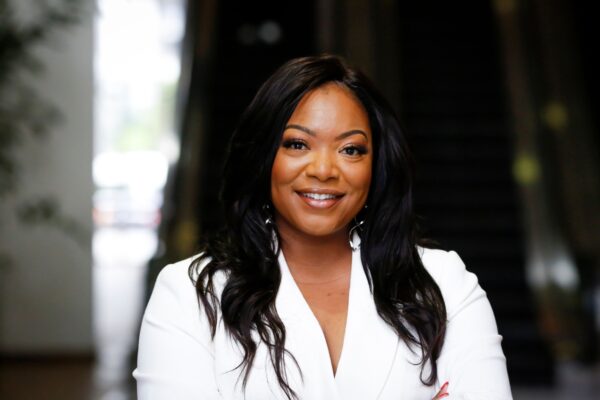By Renita Young
The recent slump in markets is testing the army of retail investors who started trading during the pandemic.
It’s the first bear market many of them have experienced, and will require a different playbook from the “stocks only go up” mantra that worked so well for much of the past two years.

Teri Ijeoma, whose popular online courses, including “Trade and Travel,” have taught over 28,000 students the basics of day trading, says she’s predicting a recession and advising students to stay on the sidelines if they haven’t learned advanced strategies like hedging and short-selling.
Like many of her students, Ijeoma’s career didn’t follow a traditional finance path. Growing up in Dallas, she dreamed of becoming an architect until her high school enrolled her in a business program for underrepresented students and encouraged her to apply to the Massachusetts Institute of Technology, where she majored in management science.
After a summer internship at Morgan Stanley and a stint at consulting firm Monitor Group (now Monitor Deloitte), she took a job at the nonprofit Teach for America, pursued a master’s degree at Dallas Theological Seminary, and worked as a charter school assistant principal.
Meanwhile, a day-trading hobby turned into a way to pay off debt and gain freedom to travel. Ijeoma, who now lives in Puerto Rico and just turned 38, says she initially developed her online class as a way to teach her friends how to trade, but booming markets supercharged demand in 2020 and 2021. Revenue from her course, which charges students about $5,000 for an eight-week program, soared to more than $1 million in the month of May alone.
Ijeoma spoke with Bloomberg News last month about her career, her business and her outlook. The interview has been condensed and edited for clarity.
Q: How did you become interested in financial markets?
A: My junior year of high school, I did a program called LEAD. They took minority students who were at the top of their class and introduced us to business. I remember learning about stocks in the summer program. And then seeing Google come out [in a public offering]. I remember telling my grandmother, “Granny, we’ve got to get some.” And she was like, “Baby, we ain’t got no money. And we don’t know how to open an account.” So we missed that opportunity.
Q: After your internship at Morgan Stanley, why didn’t you choose to work on Wall Street?
A: I wasn’t sure that I wanted to sit in a cubicle all day and not see the sunlight. Consulting just seemed so much more beautiful. They got to travel, they got to interact with different companies. Lo and behold, it was still the same.
Q: So next was education, right?
A: I ended up going over to Teach for America and working in their teacher preparation department and their administrative level. I definitely learned how to work hard. I also learned how to manage teams. At one point, I think I was managing like 27 people.
So from there I left and went to [Dallas Theological] Seminary, of all things. Usually the trajectory is to go get your MBA. But at MIT, we took classes at Sloan [MIT Sloan School of Management] with all the MBA students. So I went to seminary, I majored in media and communications. We learned every book in the Bible, but then I also learned how to preach.
When you’re preaching, you have to take this complex scripture or complex curriculum and then teach it and break it down into parts. And then you have to break it down in a way that people are willing to listen and actually absorb it.
Q: Tell us about what you did next.
A: After working in ministry, I moved over to become an assistant principal of a charter school, elementary, in Dallas. I had a boss who had four bosses and they never agreed on anything. I was always between a rock and hard place. [In October 2016] my friend passed away. I was in this job that I hated and I was gaining weight, I was getting sick, my hair was falling out. And then he passed away. It just was, “Teri, you’ve got to do something different. Life is too short.”
I had already at that time been trading six years. I started practicing [trading] every day. My goal was just to make $300 a day to replace my assistant principal income. Eventually by 2017, I was able to quit my job and start traveling around the world, because I had learned how to make about $300 a day, on average. Sometimes you make money. Sometimes you lose money. But it was enough for me to feel good about traveling and affording things on my own.
Q: What led you to launch Trade and Travel?
A: Trade and Travel started because I was traveling around with a group of about 20 other people in a program called We Roam. And when we were traveling, some of the other people would ask me to go on coffee dates. And they would say, “Will you tell us a little bit more about trading?” So I decided, instead of going on these one-off coffee dates, I’ll do a class at the local co-working space. I thought it’d be a one-time thing, but they loved it. And I loved it. It was this beautiful mix of all my skill sets.
That first class was in Thailand. We did it again in Vietnam. And then when I got back home, I was wrapping up my last part of seminary and my friends in Dallas asked me to teach them. I said, “I actually have a class online.” I didn’t have a class yet. I just wanted to see if somebody would buy it. And two people said, “Yeah, teach us.” So I built out an online course and now it’s gone from two to over 20,000 that I’ve taught how to trade.
Q: How much have you made trading and how much have you made off of the Trade and Travel course?
A: So in trading, you’re looking at percentages of your actual cash amount. When I was trading as a teacher, I was only trading about $35,000. And even with my goal of $300 per day at the max, I would end up making around $60,000. So that’s almost a 100% return. That’s great as a trader. But it’s only $60,000. I remember one year, I think it was 2019. I traded an account that was $25,000. I made $75,000 and I was so excited because I had made a 300% return. But when you think about 2019 in my course business, that was the first year I had made a million dollars.
Unfortunately I have to say in 2020, I reported a loss [from shorting Tesla]. Sometimes it happens, right? I still had a pretty significant tax bill. Last year was pretty good. It was positive, and I made seven figures in trading, but it definitely was not as big as the courses.
I’m still not trading a huge account when I trade. And with Trade and Travel, it’s based on how many people decided to take my course — 2020 was a crazy amazing year. So the topline revenue is over $40 million, but then you have to take out some for expenses.
Q: What do you think is the most important skill in trading?
A: Thinking about small bite-size goals is really important. Small, consistent goals add up. Then having a big risk management plan in place. We [at Trade and Travel] have six different things we look at with risk management, whether that’s the quantity of your trading, to your stop losses and protecting yourself, to your risk tolerance. So having that risk management plan in place is important.
Q: We’re seeing rising interest rates, the hottest inflation in a generation, war. All these things have made equities very volatile this year. As the market declines, is it causing students to drop out of the class?
A: It’s not causing students to drop out, it’s actually causing them to upgrade to our VIP program. Advanced economic conditions require advanced trading tools like shorting, covered calls and options which we cover in VIP. I personally think that we are heading into a recession, and people will win with strategies that make money as stocks go down.
Q: How else are you coaching your students on how to deal with both this current downturn and the possibility of a recession?
A: They have to decide their investing timeframe. If they’re a long-term investor, maybe they want to start slowly purchasing shares as stock prices are falling to places we haven’t seen in years. Putting a little bit of money to work each month as the prices go down could allow them to catch some of these great opportunities.
As a [short-term] trader though— focused on bringing in regular income—they’ve got to up their game in terms of strategy. Short-selling so that they can make money on the way down, and learning how to use options trading so that they can buy puts or sell verticals.
Also, if someone is not familiar with more advanced techniques, I believe this is a good time for them to build up their cash and potentially sit on the sidelines until the market stops falling. If the market falls into recession, this is not a good time to buy the dips and just hope for the market to rebound quickly.
More stories like this are available on bloomberg.com.




